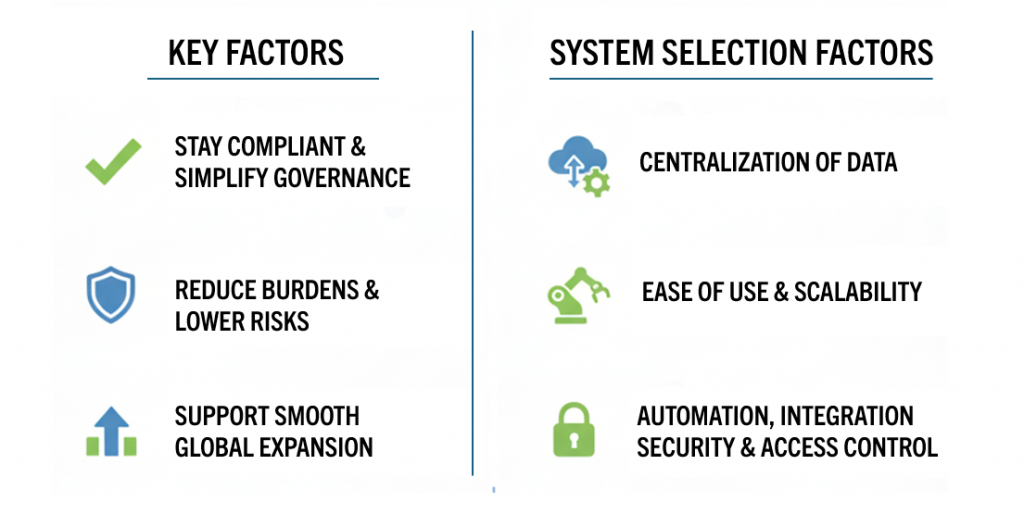The Best Legal Entity Management Strategies for Global Expansion
Business growth rarely follows a straight line. It takes many forms, such as entering new regions, adding innovative products, or stepping into related industries. Whatever the path, legal entity management determines how smoothly this journey plays out.
Most leaders understand the importance of launching a new entity. However, choosing the right jurisdiction, setting up governance rules, and staying ahead of international compliance obligations tend to be less visible until they become urgent.
That is why modern entity governance solutions are no longer optional add-ons. They give companies a way to organize, monitor, and adjust their structure as global ambitions unfold.
Read more to get a closer look at what makes effective legal entity management possible and the global trends that will shape expansion strategies going forward.
What is Legal Entity Management?
Legal entity management is about keeping track of all a company’s separate parts, like corporations, LLCs, branches, and subsidiaries. This becomes crucial, especially when they operate across different countries. Maintaining up-to-date corporate records is one way to ensure timely compliance with local laws and managing governance responsibilities in every market.
When done well, it helps companies in the following ways:
- Stay compliant with varying regulations and simplify governance processes
- Reduces administrative burdens and ensures there are lower risks
- Supports smooth and confident expansion into new markets

Choosing Legal Entity Management Systems and Services
Selecting the right entity governance solutions is essential for achieving efficient global operations. The ideal entity management system should simplify governance, automate compliance, enhance transparency, and scale alongside your global business expansion.
Here are the factors a company needs to look out for:
- Centralization of Data: Look for a platform that centralizes all entity data in a secure and accessible place. This reduces errors and saves time when finding or updating information.
- Ease of Use: The system should support collaboration across teams, which allows multiple users and flexible permissions. Since scalability also matters, choose software that can grow with your organization and handle additional entities or users seamlessly.
- Automation: Compliance tracking with alerts and deadline reminders reduces manual work and minimizes risk. Integration capabilities are critical, too. The software should connect smoothly with other business systems, like HR and finance, to maintain data consistency.
- Security: Ensure the system provides granular user access controls to protect sensitive corporate data. Also, consider vendors that regularly update their platform to adapt to changing regulations and improve functionality.
Global Business Trends Shaping Legal Entity Strategies
As businesses expand their footprints, organizations can thrive in the international marketplace by adapting to key trends. Here is what the future may hold for legal entity management systems:
- Digital Transformation in Entity Management
Technology is no longer optional for managing legal entities. Automation reduces manual work by handling filings and compliance updates automatically. Integrating entity management with finance and ERP systems ensures data accuracy across departments. This technology speeds audit processes and boosts overall agility for global corporations.
- Growing Regulatory Complexity and Globalization
Conducting operations on a global scale requires a company to constantly adapt to new and evolving rules in every region. Laws on taxation, data privacy, and governance vary widely across borders.
Centralized platforms that track all requirements help companies stay organized and compliant. More companies are also working closely with regulators, sharing updates promptly to build stronger relationships and transparency.
- Enhanced Data Security and Privacy
As cyber threats keep increasing, protecting entity data has become more crucial than ever. Global organizations need to act proactively as new privacy laws bring hefty fines for non-compliance.
Systems with audit trails help track every action within platforms. While this aids in audits and investigations, robust data security safeguards a company’s reputation and supports regulatory compliance.
- Talent and Expertise Challenges
More complex regulations are creating a gap in legal and international compliance skills. Many businesses focus on training their current teams to keep up. Meanwhile, automation handles repetitive tasks, freeing experts to focus on higher-level work. Some companies also hire external specialists or outsource certain functions to fill expertise gaps efficiently.
Businesses witness growth by expansion into new markets, products, or industries. However, this evolution makes managing legal entities with precision and foresight a challenge. With robust strategies, companies can ensure compliance, reduce risks, and support smooth operations.
At ANSR, we specialize in helping organizations and Global Capability Centers (GCCs) navigate the complexities of global entity management. Partner with ANSR to simplify your legal entity oversight, stay ahead of compliance challenges, and accelerate growth with confidence.




